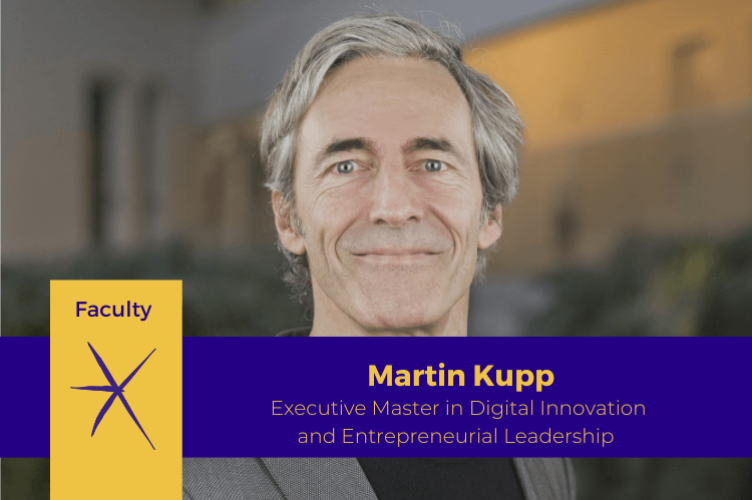Executive Master in Digital Innovation and Entrepreneurial Leadership
Meet the faculty: Martin Kupp
 With a passion for entrepreneurship and energy, Martin Kupp is a professor for Entrepreneurship at ESCP Paris campus and has co-founded Renaissance Fusion, the first fusion start-up in continental Europe.
With a passion for entrepreneurship and energy, Martin Kupp is a professor for Entrepreneurship at ESCP Paris campus and has co-founded Renaissance Fusion, the first fusion start-up in continental Europe.
In the Executive Master in Digital Innovation and Entrepreneurial Leadership (EMDIEL), Martin follows some of his other passions and teaches strategic innovation and organizational creativity.
ESCP: Martin, in 2011 you wrote a book about contemporary artists and what managers can learn from them. How did you come up with this idea?
Martin Kupp: The idea actually came from working with companies in executive education programs. In these programs I like using case studies as a way to introduce real-life problems and examples. But a lot of these case studies are about well-known companies like Apple, Tesla, or Siemens and the like. Often executives are a bit tired of hearing about the same companies over and over again. So we, my co-authors Jamie Anderson, Joerg Reckhenrich and myself, started to look for new and interesting stories. Jamie and myself have a business school background, but Joerg is an artist and also an art historian. When we discussed what kind of stories we were looking for, Joerg told us that our questions reminded him of artists struggling to break into a market, struggling to stay relevant or being confronted with new technologies and techniques. We found that interesting and started to explore further.
ESCP: And what would you say are the key takeaways for managers when it comes to innovation?
Martin Kupp: Key takeaway number one is: You are not alone. Executives often think that they are the only ones facing a specific challenge, but in fact most of the challenges today’s executives face, are the same or some sort of deviation from essential challenges that not only other executives, but even artists have faced for a long time.
The second takeaway is that to solve a problem, you often have to take a fresh and new perspective on a subject. You need to leave your comfort zone of things you know, things you master and feel comfortable with. And looking into another industry, looking into a different time and taking a new perspective, can help to unlock creative potential. And last but not least, art is emotional and engages people. And emotions and engagement are key to learn, unlearn and change.
ESCP: How do you incorporate “creative” tasks to stimulate innovation into your teaching?
Martin Kupp: The German artist Joseph Beuys famously said that every human being is an artist. When he made this statement in the early 1960s, it shocked the exclusive art world: could every one of us really produce and define art? In our view, Beuys didn’t mean to suggest that everyone should take up the visual arts or writing (though this may be part of the journey). Rather, he was referring to mobilizing each individual’s latent creative abilities – engaging our creative thoughts, words and actions and expressing them in meaningful ways. For this to happen we need personal creativity, process creativity and collective creativity.
To stimulate innovation in my own teaching, I like the approach of developing ideas and then adding different perspectives by taking on different roles. I, for example, ask myself: If I was a participant, what would I expect? Or, if I was a colleague of a participant, what would I want my colleague to walk away with from the program and so on. This helps me to develop a program from different perspectives.
ESCP: With big data, AI, and machine learning disrupting global markets, what role do you think human creativity will play in strategic innovation in the coming years? Where do you think the human brain will win over machines?
Martin Kupp: We are starting to see that AI can actually be quite creative. If we stay with the above idea that creativity often needs different perspectives, then AI can generate these different perspectives very quickly. We just need to prompt it to take on specific roles, or assume different contexts. So ultimately it is not about AI winning over humans or humans winning over machines, but about finding the best way to use the immense potential of these technologies. And for this we need expertise, but also the willingness to try, iterate, take different perspectives - ultimately using our own creativity to spur the quality of the output of machines.
ESCP: One thing that is unusual about you is, that you not only research on and teach about topics like innovation, creativity and entrepreneurship, but you actually also co-founded a company. How did this happen and do you think that it has changed your way of teaching?
Martin Kupp: To be quite honest, this was not planned at all. As a professor for entrepreneurship I get exposed to many startup ideas from my students. And I also coach startups in ESCP's Blue Factory and beyond. And while I like a lot of these ideas, I never felt like joining the founder. For me creating a company and doing research about people that create companies are two very distinct things that can go hand in hand but do not have to.
But when I met Francesco Volpe in 2018 and he told me about his ideas of bringing fusion energy out of the lab onto the grid, I knew that this was something so fascinating and incredible, that I wanted to be a part of it. I never felt like this before. And so I decided to support Francesco and to co-found Renaissance Fusion with him.
We are now more than 60 people and the company is based in Grenoble. Has this changed my way of teaching? Yes, I think it has. I would say that it added a perspective, it added a layer to the way I think about entrepreneurship. And this helps me to again think differently about the way I teach and engage with participants.
ESCP: Finally, what is your favorite part about teaching the EMDIEL participants?
Martin Kupp: As you might have guessed by now, I do like working with executives a lot. While it can be very challenging, it can also be highly rewarding. For me, the idea of teaching executives is to enter into a dialogue and to meet them on eye-level. While this is or should also be true for bachelor or master students, the additional dimension that I like a lot is their business experience. Having worked already for some time in an industry and having lead people, shifts the discussion significantly. Discussions become quickly very specific and also personal. And ultimately, I often feel that I learned at least as much as the participants.
Campuses
